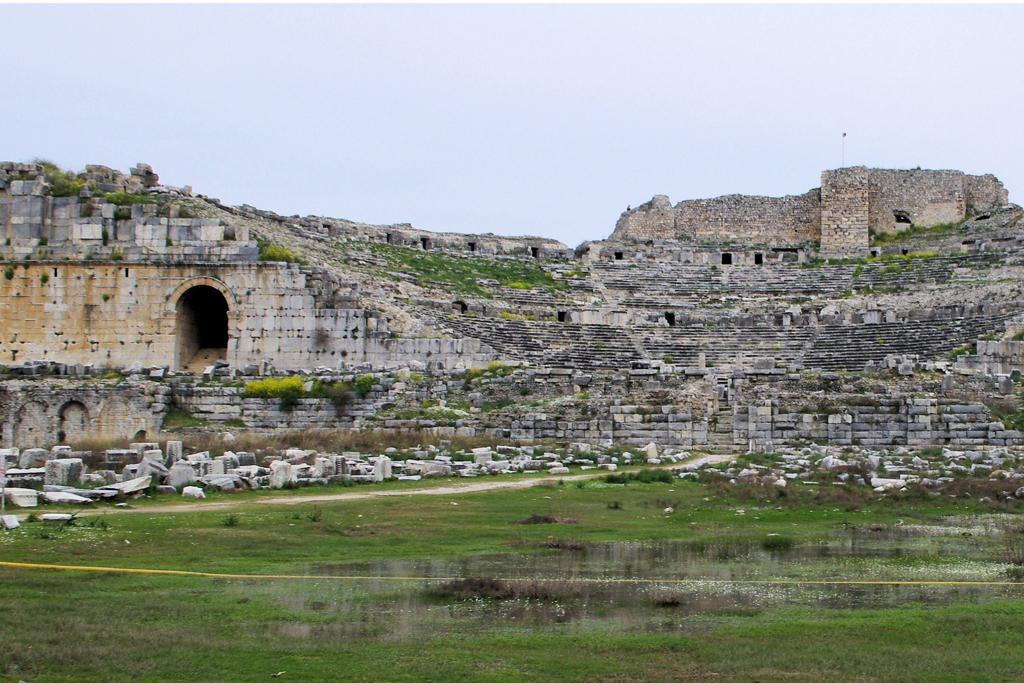Is rationalism a form of belief?
The remains of the ancient theater in Miletus, Turkey.
MILETUS, Turkey — Is rationalism a form of belief? In a time when religious fundamentalism across all faiths has provoked an aggressive reaction from thinkers like Richard Dawkins, Daniel Dennett and the late Christopher Hitchens, and with atheist or non-religious "congregations" forming, it's a question worth exploring.
If reason is a kind of faith, then Miletus, on Turkey's Aegean coast, is its Bethlehem. This is where the very first Greek philosophers, including Thales, Anaximander, and Anaximenes — lived.
And just a few miles off the coast is the island of Samos, where Pythagoras lived around the same time.
"This was the center of the world," Dr. Philipp Niewoehner, an archeologist, said as we stood in the ruins of an Ottoman fort, atop the ruins of a Roman theatre, atop a cave sanctuary.
Niewoehner said he is reasonably certain that the cave was the site of religious cult rituals in the time before history was written.
Until that moment, people understood themselves and their place in the world in religious terms. Everything in their lives was a result of divine rule, from the smallest events to the largest, like the earthquakes that regularly roll through this part of the world.
Sometime between 600 and 550 BCE mankind made a huge leap forward in thought here. In the moment of Thales and Pythagoras, these ideas shifted toward the idea of man, not God, being the measure of all things.
Yet the idea that man was capable of understanding what causes natural phenomena from sunrise and sunset, why the stars in the sky move in certain patterns, and why the earth shakes beneath our feet, very quickly took on the aspects of religion.
Like Jesus and Buddha, neither Thales nor Pythagoras left behind any writing. They accumulated pupils and followers. And over a period of a century or so, legends about them grew. It would be almost two centuries before their thoughts were codified; Aristotle preserved both men’s ideas for history.
Thales was the first to look into natural phenomenon not as a function of gods but as something else, something that can be understood by scientific, rational thinking. He used mathematics and cosmology — abstract thought systems imported along with trade goods from Babylon — as tools for rationally explaining movements of the stars and planets.
Pythagoras brought mathematics into a new kind of understanding. He called three the perfect number. It’s not difficult to see the relationship between this idea and the Holy Trinity.
Thales’ idea that water is the original substance is echoed in the Jewish creation story — codified at around the same time the philosopher lived — of God creating first the sky and then dry land out of formless waters.
Within their worlds both men lived lives that were multi-faceted and quite modern by our standards: Thales was a businessman who, using his superior knowledge of how nature worked, was able to make shrewd investments in olive harvests and cornered the market in olive oil.
Pythagoras got in touch with his inner guru and started a cult, with him at the center. After his death, his disciples fought and split into opposing camps — just like devotees of any new religion.
Even at the beginning, a balance had to be struck between the thinkers and the society they inhabited. Miletus was a very religious place, according to Professor Volkmar von Graeve, an archeologist who has been digging at the site for almost fifty years.
"Thales would not have tried to impose his ideas on anyone," von Graeve said. "If he did, they would have killed him."
Clearly the tension between religion and rationalism was there at the beginning. It has continued through the millennia. Think of the Catholic Church forcing Galileo — under threat of torture — to renounce his proof that the earth revolves around the sun.
But the lesson learned at Miletus is that for all the tension between rationalism and religion, the two ways of thinking about the world feed off each other.
Most people's need for "community" is what links rationalism and religion. In January of this year a group called The Sunday Assembly was started in London.
It is not a church but its founder, Sanderson Jones, acknowledges the "godless" group grew out of something missing in his life: the community you find in a religious congregation.
"We just think religion doesn't have a monopoly on community celebration and transcendence."
That is a perfectly rational thing to say.
Every day, reporters and producers at The World are hard at work bringing you human-centered news from across the globe. But we can’t do it without you. We need your support to ensure we can continue this work for another year.
Make a gift today, and you’ll help us unlock a matching gift of $67,000!
